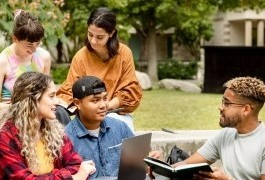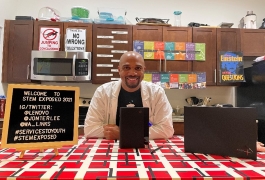Looking Through the Lens of LGBTQ Chemists :)
October is LGBT History Month, an annual observance of lesbian, gay, bisexual and transgender history, and the history of the gay rights and related civil rights movements. It is intended to encourage honesty and openness about being LGBT. In recognition of the accomplishments of scientists who have fought and continue to confront challenges of discrimination, non-acceptance, and uncomfortable environments, we bring you the voices of three ACS members who shared with us their experiences and perspectives on being both chemistry professionals and members of the LGBT community.
Chris Bannochie
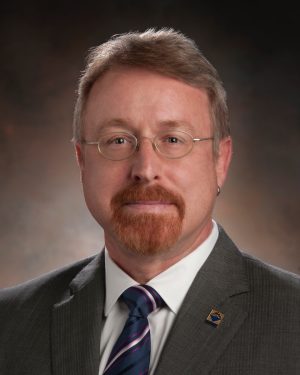
You’re out at work — what’s that like?
For me, working in my laboratory feels pretty normal. But my organization is fairly decentralized, and some other LGBT employees work at operating facilities where attitudes tend to be more conservative. For them, my sense is that the environment is not yet as welcoming to LGBT coworkers who are out.
How did you decide to come out?
I outed myself at work in a very public way, when I wrote an editorial for a local paper defending our company’s Gay, Lesbian or Bisexual Employees and Allies (GLOBE) group’s celebration of Gay Pride Day at the Savannah River Site (SRS). The next day, my column was posted on our company network, so suddenly, I was out to everyone. Within my own lab, people took it in stride, and the response was fairly positive. In fact, my own associate laboratory director wrote me a message strongly supporting my editorial position.
Can you talk about your involvement with LGBT rights at work?
In 2002, I founded my company’s GLOBE group for both federal and contractor employees at the SRS. The Department of Energy (DOE) headquarters in Washington DC was fine with it, but our local field office was not as receptive. For a number of years we had celebrated Gay Pride Month (which later became LGBT Pride Month) as part of DOE’s special emphasis program. But the feeling of inclusiveness in the organization kept changing, depending on whom was managing the various contractor and Federal Diversity Offices at the time. In fact, it took seven years of persistence before the company and field office officially recognized our group. Our request was rejected numerous times, but we kept asking — and also successfully petitioned the company to grant same sex spousal benefits.
I’ve also been active in diversity efforts, both within ACS and with the National Organization of Gay and Lesbian Scientists and Technical Professionals (NOGLSTP), where I’m a board member. I played a role in getting ACS to host a reception for NOGLSTP’s LGBT Chemists and Allies Caucus at national meetings. Just as it happened at SRS, we were initially turned down, but eventually gained the backing of ACS’ then-President Eli Pearce. Over the last few years, the reception has become a regular part of the conference.
Have you noticed any change in attitudes toward LGBTQ employees since your group was recognized?
I can’t really say how much people or their attitudes have changed. But at least they now know that the company will not tolerate any type of harassment of LGBT employees, and it will be very aggressive in defending them.
It’s also encouraging that many LGBT students are out now, and many are active in student chapters of groups like Out in Science, Technology, Engineering and Mathematics (oSTEM), and NOGLSTP. I always advise students to look at a company’s diversity policies before taking a job. This used to be really important, when there was a major divide between companies that were supportive of LGBT rights and those that weren’t. Now most companies are on board, but it’s still a good idea to look at a company’s diversity policies before deciding to work there.
Do you have any lessons or advice you would share with young chemists?
You’ve got to live your truth and be persistent. If something is important to you at home, it has to be at work, too. It’s just too stressful to live a double life. A lot of people were standing in our way, and we just kept going around them. So don’t take ‘no’ for an answer. I’ve also found a lot of inspiration in the work and writings of Brian McNaught, a consultant on LGBTQ+ diversity.
Chris Bannochie has authored a chapter titled, “Alphabet Soup and the ACS: The History of LGBT Inclusion,” for a book ACS is producing on the topic of diversity.
Barbara Belmont
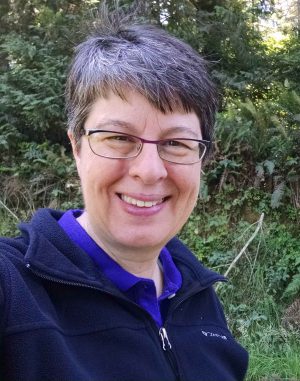
Can you say a little about what you do?
I’m a full-time lecturer at California State University Dominguez Hills, where I teach analytical chemistry. For more than 30 years, I’ve also run an independent laboratory that does outsourced chemical analyses and quality control investigations for manufacturing clients.
What was coming out at work like for you?
I sometimes say that I’ve been coming out for 40 years. When I first started teaching, I was really aware of the possibility that coming out might interfere with my teaching evaluations, or that students would be hostile. So I kept my personal and work lives separate.
Over time, I started sharing more and more about myself, and then things really started changing for me about seven years ago. I had been trying to contact the Gay-Straight Alliance on campus to let them know about an upcoming event. The group was in transition, and it was hard to reach anyone. It started me thinking: here I was, a seasoned gay activist, and if I couldn’t locate a resource on campus, how much harder must it be for students who are just coming out and looking for resources and support? So I decided to start letting my students know that I was lesbian in countless small ways — and that way, the one or two gay kids in class would know they weren’t alone. I think that teaching from an open and honest place has made me a better teacher and made the whole arc of the course more enjoyable for everyone.
How does one do that — come out in small ways?
I use lots of approaches, like putting up “safe space” signs in my office, or even making make jokes about homogeneous, as opposed to heterogeneous, chemicals. Especially in the last few years, I’ve found that it’s much easier to be open about myself by casually mentioning my wife in conversation. It makes it a lot easier to come out without making a big deal of it.
What sort of supports have you found useful?
When I was in college, I actually worried that I might be the only person like me in the world! Believe me, there really weren’t a lot of resources that one could turn to back then. Luckily, I found a support group of like-minded women, which was a big help.
Years later I found ar support group when I joined the National Organization of Gay and Lesbian Scientists and Technical Professionals (NOGLSTP), and these days, I am an activist within ACS on behalf of NOGLSTP.
Do you have any advice for LGBTQ students?
Even today, many young gay people are still understandably concerned about keeping their sexual orientation private, while others prefer to be totally upfront about it. Whichever approach you choose, my advice is, when you’re evaluating potential employers, check out their equal employment opportunity or LGBT policies, but also look beyond. I recommend checking out the Human Rights Campaign’s website to see the company’s Corporate Equality Index rating — and see if they not only ‘talk the talk,’ but also ‘walk the walk.’ My personal advice is that you probably don’t want to work for a company where who you are is going to be a problem.
Lee Penn
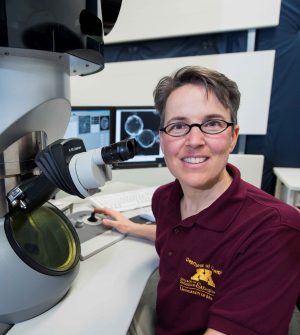
Can you talk about your experience as a LGBTQ+ person in the workplace?
As someone who is different from the straight, cisgender folks I have worked with, I felt like I was expected to be silent about my personal life. For example, I could not even take part in even routine conversations with coworkers about what people did over the weekend with their families.
In my current workplace, people are inclusive towards folks holding marginalized identities. In my own experience, people ask me about my wife, what my child is up to, and what we all did over the weekend. I feel I am a full member of my department.
Can you talk about the training you do around supporting students with marginalized identities — that is, students of color, LGBTQ students, and others?
LGBTQ people, as well as other marginalized people, have been leaving science and engineering in disproportionate numbers. So over the last five years, I’ve been engaging faculty, staff, and students in workshops, and the responses have been very positive. I use data to illuminate the problem, such as the American Physical Society’s LGBT Climate in Physics study. That study found that significant percentages of LGBTQ physicists reported experiencing exclusionary behavior due to gender, gender expression, gender identity, sexual orientation, or sexual identity (roughly 22% of LGBTQ men, 30% of LGBTQ women, 45% of gender non-conforming, and nearly 50% of trans respondents).
My workshops also address intersectionality, a concept explored by feminist and civil rights advocate Kimberlé Williams Crenshaw. Its central idea is that you can’t be defined by any single identity. Instead, all of your experiences and identities — including your gender identity, race, level of education, physical ability, native language, age, religion, and others — collectively inform how people perceive you, and how you perceive yourself and others. Some of these identities bring privilege, while others bring marginalization — and they all mix together to affect your experiences as you navigate life.
Do you have any advice for LGBTQ students?
There’s no one-size-fits-all answer, because everyone has their own situations and decisions to make. For example, I encounter international students who have very good reasons for not being out: if their family found out they were LGBTQ identified, they would lose all their support. So they can’t be visibly out to anyone, anywhere, who could possibly get word back to their family. In fact, some are from countries where it’s actually illegal to be queer.
Even in the U.S., people have different experiences — depending on where one grew up and other factors. But one thing that helps almost any student is to find a mentor they trust. They need to be able to talk openly about the issues facing them and their life in chemistry.
Can you talk about how you view ACS and its approach to members of the LGBTQ community?
It’s good that ACS is starting to address this issue. But I also feel that ACS needs to work at being more inclusive, such as choosing conference venues and hotels that have gender-neutral bathrooms where we won’t feel like we’re being policed — and that are also wheelchair accessible. In my view, ACS should be actively choosing infrastructure that doesn’t limit access.
LGBTQ Allies at ACS
Learn how the LGBTQ communty at ACS advocates for and promotes equal rights, fair practices, and awareness.



